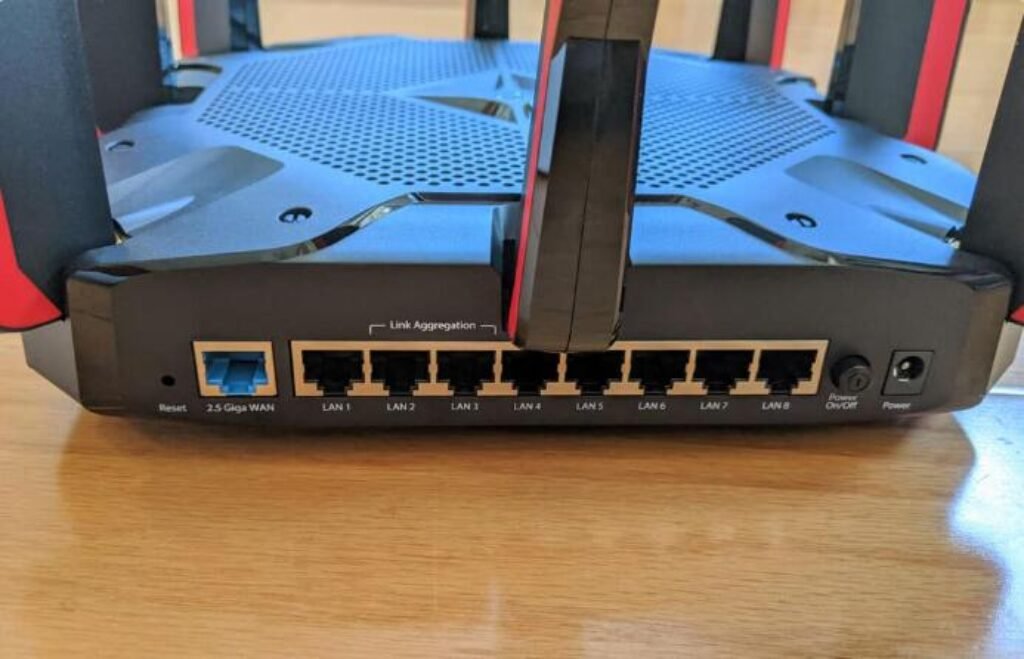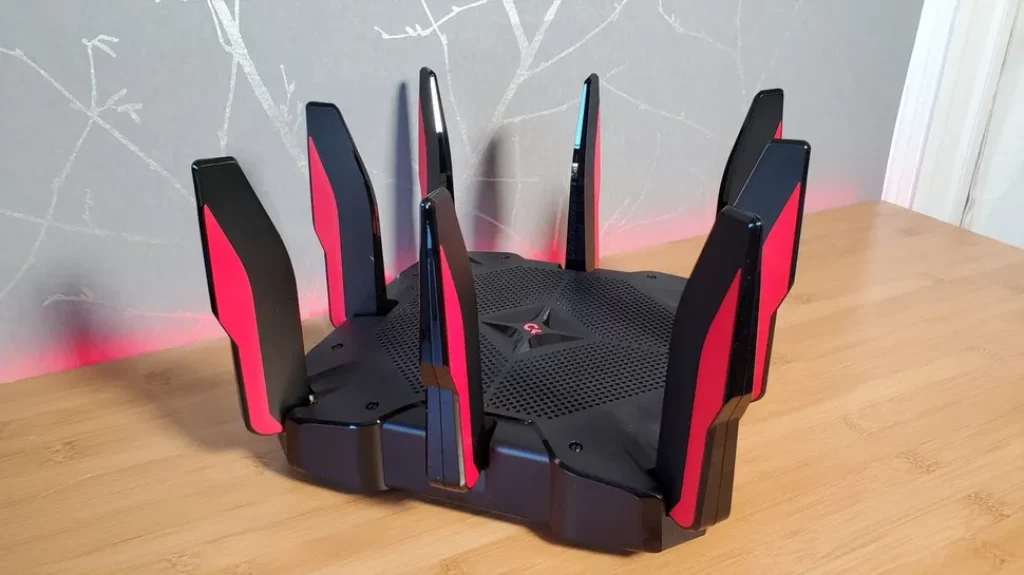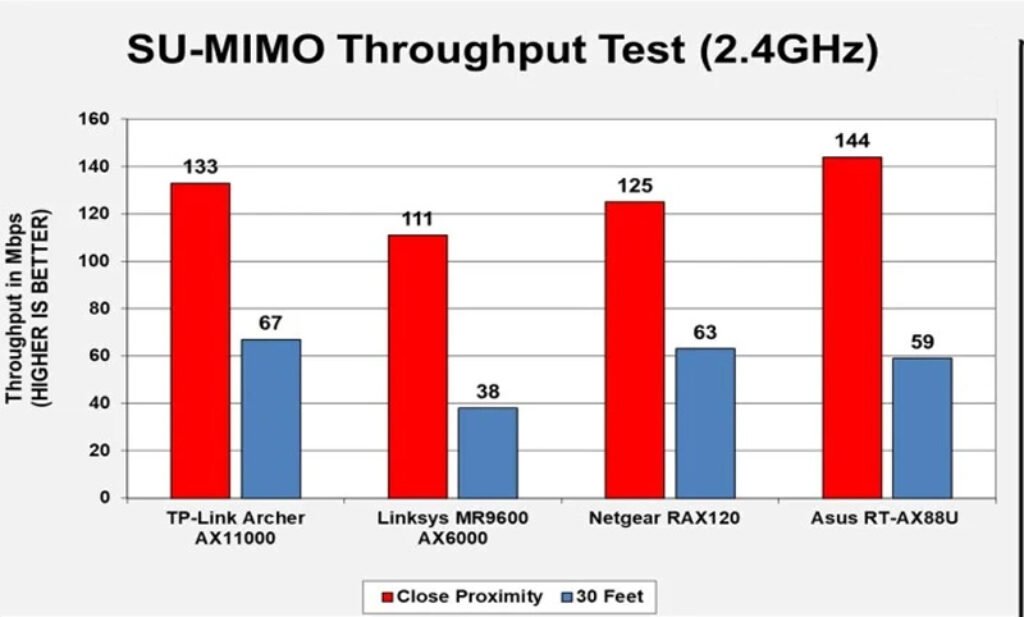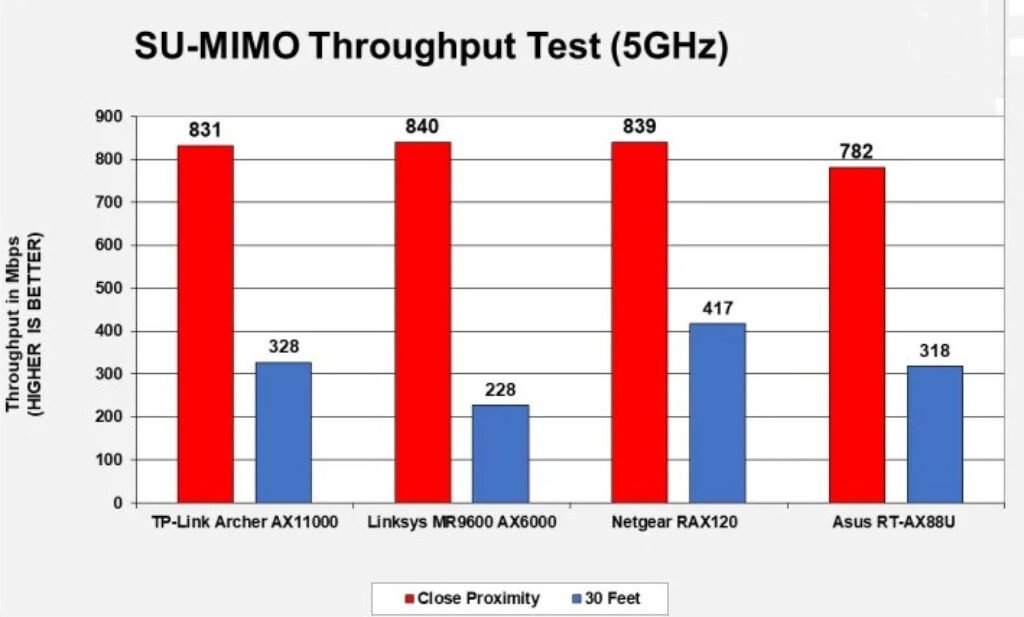As a gaming router, the TP-Link Archer AX11000 is a full-featured router anyone can use. Thougjt it looks like a duck. But if you’re in the market for a fast and cool-looking Wi-Fi 6 broadcaster that has a ton of other things for you to brag about, the TP-Link Archer AX11000 is still worth to buy. Because its only $252 now vs $399.99 when it first launched.
TP-Link Archer AX11000 Router Pros and Cons
TP-Link Archer AX11000 Router Design
As a router blogger, we will review the TP-Link Archer AX11000 router today. The TP-Link Archer AX11000 router offers some serious power, so it is no hidden that it comes in a larger package. The first thing you’ll note getting the Archer AX11000 out of the box is how massive it is. The body itself is a huge square, measuring 9.5-inch (240.5 mm) wide and 2.2-inch (55.4 mm) tall. This is a horizontally oriented router in an almost matte-black plastic, that takes up considerable desktop real estate with its square design. On top of that, it has a large brick of a power supply that also takes up even more space, in addition to a total of eight antennas that are adorned in red.

Next, you’ll note the eight antennas and might feel a bit taken aback thinking of the pain of having to assemble them to the router’s body. The good news is it’s a no-brainer job. Pick one and push it into a connector, and it will get firmly attached after a click sound. Now to detach, just jank it out.

The TP-Link Archer AX11000 boasts a compact, square design. One side of the router features an array of eight Gigabit LAN ports alongside a 2.5 Gbps WAN port. On another side, you’ll find dual USB 3.2 Gen 1 ports, including one USB-C and one USB-A, offering versatile connectivity options. The third side is home to the router’s WPS button, Wi-Fi toggle, and LED power buttons. The fourth side remains unadorned. Weighing in at a substantial 3.5 pounds (1.6 kg), the TP-Link Archer AX11000 exudes a sense of solidity and durability.
The Archer AX11000 is designed to stay put on a flat surface, but you can also mount it on a wall.
TP-Link Archer AX11000 Router Feature
- ltra-Fast Wi-Fi for Extreme Gaming – AX11000 speed machine that delivers Wi-Fi Speeds Over 10 Gbps: 4804 Mbps (5 GHz Gaming) + 4804 Mbps (5 GHz) + 1148 Mbps (2.4 GHz)
- TP-Link HomeCare: Protect your network and connected devices with a free lifetime subscription to TP-Link HomeCare featuring next-level antivirus, robust parental controls, and QoS
- More Devices with Less Lag: OFDMA and MU-MIMO technology deliver data to multiple devices, simultaneously
- Game Accelerator: Automatically detects and optimises your gaming streams, ensuring that your network keeps up with even the most intense action sequences
TP-Link Archer AX11000 Router Specifications
| Product Dimensions | 14.37 x 11.42 x 4.72 inches |
| Item Weight | 2.61 pounds |
| Item model number | Archer AX11000 |
| Date First Available | September 19, 2020 |
| Manufacturer | TP-Link USA Corporation |
TP-Link Archer AX11000 Router Performance
The TP-Link Archer AX11000 router earned high marks on our throughput tests. It’s score of 133 Mbps on the 2.4 GHz close proximity (same room) test was faster than the Linksys MR9600 and the Netgear Nighthawk AX12 RAX120 but not quite a speedy as our other Wi-Fi 6 router Editors’ Choice, the Asus RT-AX88U. But, it showed good range performance with a leading score of 67 Mbps on the 30 foot test.

Performance on the 5GHz band was also very reliable. The TP-Link Archer AX11000’s score of 831 Mbps on the close proximity test was right there with the MR9600 and RAX120 and was 6 percent faster than the RT-AX88U. At 30 feet, the Archer AX11000’s score of 328 Mbps was faster than the MR9600 and the RT-AX88U but couldn’t catch the RAX120, which led with a score of 417 Mbps.

We measure file transfer performance by moving a 1.5 GB folder consisting of photos, video, music, and office document files back and forth between a USB 3.0 drive that’s connected to the router and a desktop PC just to test write and read speeds. The Archer AX11000 router write score of 68 MBps was faster than the RT-AX88U and nearly the same to the RAX120. The MR9600 led with a score of 73 MBps, while on the read test the AX11000 led the field with a score of 85 MBps.




 Amazon.com
Amazon.com 



